 Web Front-end
Web Front-end uni-app
uni-app UniApp implements expansion and usage skills of native components of mini games
UniApp implements expansion and usage skills of native components of mini gamesUniApp implements the expansion and usage skills of mini-game native components
Introduction:
UniApp is a cross-platform front-end development framework that supports the simultaneous development of applications for multiple mainstream mini-program platforms. In UniApp, we can improve the performance and user experience of the application by extending the native components of mini games. This article will introduce UniApp's techniques for expanding and using native components of mini-games, and give corresponding code examples for your reference.
1. Why expand the native components of mini games
The native components of mini games have better performance and richer functions, and can provide a better user experience. By extending the native components of mini games, we can directly call the functions of native components of mini games in UniApp, allowing the application to better interact with the native environment. At the same time, by expanding the native components of mini games, the performance of the application can be improved, and resource consumption and loading time can be reduced.
2. Methods of extending native components of mini-games in UniApp
UniApp supports extending native components of mini-games through cml-plugin-platform. The specific steps are as follows:
- First, create a folder named cml-plugins in the root directory of the project.
- Create a folder named platform-xxx under the cml-plugins folder, where xxx represents the name of the mini-game platform (such as wechat, qq).
- Create a folder named component under the platform-xxx folder.
- Create a folder named native-component under the component folder, and create a file named native-component.cml under the folder.
In the native-component.cml file, we can define a UniApp component to extend the functionality of the mini-game native component. For example, we can define a component named NativeButton, and the code is as follows:
<template>
<view>
<!-- 此处是UniApp组件的模板代码 -->
<button @click="handleButtonClick">{{ buttonText }}</button>
</view>
</template>
<script>
export default {
props: {
buttonText: {
type: String,
default: 'Click Me'
}
},
methods: {
handleButtonClick() {
// 此处是UniApp组件的事件处理函数代码
uni.showToast({
title: 'Button Clicked'
})
}
}
}
</script>
<style>
/* 此处是UniApp组件的样式代码 */
</style>3. Use the expanded mini-game native component in UniApp
Use the expanded mini-game native component in UniApp The components are very simple. We only need to introduce the expanded mini-game native components into the page file and use them in the same way as ordinary UniApp components. For example, we can use the extended NativeButton component in a page, and the code is as follows:
<template>
<view>
<!-- 此处是页面的模板代码 -->
<NativeButton buttonText="Click Me"></NativeButton>
</view>
</template>
<script>
import NativeButton from '@/platform-xxx/component/native-component/native-component.cml'
export default {
components: {
NativeButton
}
}
</script>
<style>
/* 此处是页面的样式代码 */
</style>Through the above code, we can introduce and use the extended NativeButton component in the page.
Conclusion:
This article introduces UniApp’s techniques for expanding and using native components of mini-games, and gives corresponding code examples. By extending the native components of mini games, the performance and user experience of the application can be improved. I hope this article will be helpful to everyone. For more UniApp development tips, please pay attention to the updates in subsequent articles.
The above is the detailed content of UniApp implements expansion and usage skills of native components of mini games. For more information, please follow other related articles on the PHP Chinese website!
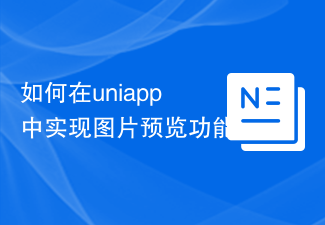 如何在uniapp中实现图片预览功能Jul 04, 2023 am 10:36 AM
如何在uniapp中实现图片预览功能Jul 04, 2023 am 10:36 AM如何在uni-app中实现图片预览功能引言:在移动应用开发中,图片预览是一项常用的功能。在uni-app中,我们可以通过使用uni-ui插件或自定义组件来实现图片预览功能。本文将介绍如何在uni-app中实现图片预览功能,并附带代码示例。一、使用uni-ui插件实现图片预览功能uni-ui是由DCloud开发的一套基于Vue.js的组件库,提供了丰富的UI组
 详解:Windows 10是否内置了扫雷小游戏Dec 23, 2023 pm 02:07 PM
详解:Windows 10是否内置了扫雷小游戏Dec 23, 2023 pm 02:07 PM我们在使用win10操作系统的时候,想要知道win10更新了之后是不是还保存有以前老版本中的自带游戏扫雷,据小编所知,我们可以在商店中进行下载安装,只要在商店中搜索microsoftminesweeper即可。具体步骤就来和小编一起看一下吧~windows10有扫雷游戏吗1,首先打开win10开始菜单,点击。然后搜索,点击搜索。2,点击排在第一位的。3,然后就可能需要输入微软账户,即Microsoft账户。没有Microsoft账户的可以安装提示注册即可。输入账户密码,点击下一步。4,然后开始下
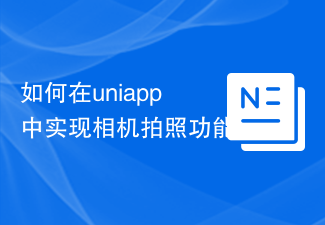 如何在uniapp中实现相机拍照功能Jul 04, 2023 am 09:40 AM
如何在uniapp中实现相机拍照功能Jul 04, 2023 am 09:40 AM如何在uniapp中实现相机拍照功能现在的手机功能越来越强大,几乎每个手机都配备了高像素的相机。在UniApp中实现相机拍照功能,可以为你的应用程序增添更多的交互性和丰富性。本文将针对UniApp,介绍如何使用uni-app插件来实现相机拍照功能,并提供代码示例供参考。一、安装uni-app插件首先,我们需要安装一个uni-app的插件,该插件可以方便地在u
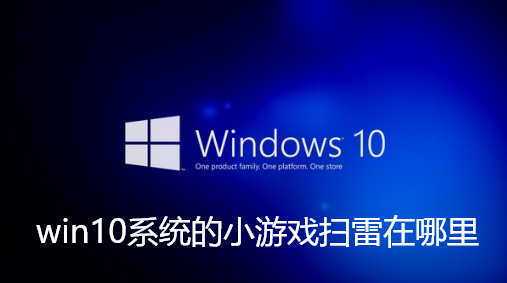 win10系统的小游戏扫雷在哪里Jul 02, 2023 pm 03:37 PM
win10系统的小游戏扫雷在哪里Jul 02, 2023 pm 03:37 PMwin10系统的小游戏扫雷在哪里?很多用户在使用Win7系统的时候最喜欢玩的就是Win7自带的扫雷了,甚至有些小伙伴会为了比拼扫雷的速度一直在玩。但是不少用户在升级了Windows10系统后发现电脑的扫雷不见了,很多小伙伴不知道怎么详细操作,小编下面整理了Win10扫雷小游戏的位置分享,如果你感兴趣的话,跟着小编一起往下看看吧! Win10扫雷小游戏的位置分享 1,首先打开win10开始菜单,点击【应用商店】。然后搜索【microsoftminesweeper】,点击搜索。 2,点击排
 如何在谷歌浏览器中游玩小游戏Jan 30, 2024 pm 12:39 PM
如何在谷歌浏览器中游玩小游戏Jan 30, 2024 pm 12:39 PM谷歌浏览器怎么玩小游戏?谷歌浏览器之中是有着非常多充满人文关怀的功能设计的,各位可以在其中获得非常多样化的乐趣。在谷歌浏览器之中,有这一个非常好玩的彩蛋小游戏,即小恐龙游戏,很多小伙伴都非常喜欢这个游戏,但却不清楚该怎么触发进行游玩,下面就由小编为大家带来恐龙小游戏进入教程。谷歌浏览器怎么玩小游戏方法一:【电脑断网】如果你的电脑使用有线网络,请拔掉网线;如果你的电脑使用无线网络,请在电脑右下角点击无线网络连接断开。②在你电脑断网的前提下,打开谷歌浏览器(GoogleChrome)即可出现谷歌浏览
 手把手教你uniapp和小程序分包(图文)Jul 22, 2022 pm 04:55 PM
手把手教你uniapp和小程序分包(图文)Jul 22, 2022 pm 04:55 PM本篇文章给大家带来了关于uniapp跨域的相关知识,其中介绍了uniapp和小程序分包的相关问题,每个使用分包小程序必定含有一个主包。所谓的主包,即放置默认启动页面/TabBar 页面,以及一些所有分包都需用到公共资源/JS 脚本;而分包则是根据开发者的配置进行划分,希望对大家有帮助。
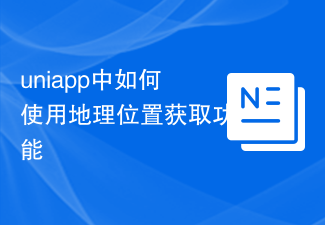 uniapp中如何使用地理位置获取功能Jul 04, 2023 am 08:58 AM
uniapp中如何使用地理位置获取功能Jul 04, 2023 am 08:58 AMuniapp是一种基于Vue.js的跨平台开发框架,它可以同时开发微信小程序、App和H5页面。在uniapp中,我们可以通过使用uni-api来访问设备的各种功能,包括地理位置获取功能。本文将介绍在uniapp中如何使用地理位置获取功能,并附上代码示例。首先,在uniapp中使用地理位置获取功能,我们需要在manifest.json文件中申请权限。在man
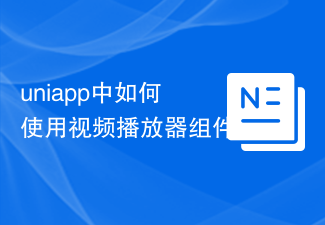 uniapp中如何使用视频播放器组件Jul 04, 2023 am 10:13 AM
uniapp中如何使用视频播放器组件Jul 04, 2023 am 10:13 AMuniapp中如何使用视频播放器组件随着移动互联网的发展,视频已成为人们日常生活中不可或缺的娱乐方式之一。在uniapp中,我们可以通过使用视频播放器组件来实现视频的播放和控制。本文将介绍如何在uniapp中使用视频播放器组件,并提供相应的代码示例。一、引入视频播放器组件在uniapp中,我们需要先引入视频播放器组件才能使用它的功能。可以通过在页面的json


Hot AI Tools

Undresser.AI Undress
AI-powered app for creating realistic nude photos

AI Clothes Remover
Online AI tool for removing clothes from photos.

Undress AI Tool
Undress images for free

Clothoff.io
AI clothes remover

AI Hentai Generator
Generate AI Hentai for free.

Hot Article

Hot Tools

MinGW - Minimalist GNU for Windows
This project is in the process of being migrated to osdn.net/projects/mingw, you can continue to follow us there. MinGW: A native Windows port of the GNU Compiler Collection (GCC), freely distributable import libraries and header files for building native Windows applications; includes extensions to the MSVC runtime to support C99 functionality. All MinGW software can run on 64-bit Windows platforms.

mPDF
mPDF is a PHP library that can generate PDF files from UTF-8 encoded HTML. The original author, Ian Back, wrote mPDF to output PDF files "on the fly" from his website and handle different languages. It is slower than original scripts like HTML2FPDF and produces larger files when using Unicode fonts, but supports CSS styles etc. and has a lot of enhancements. Supports almost all languages, including RTL (Arabic and Hebrew) and CJK (Chinese, Japanese and Korean). Supports nested block-level elements (such as P, DIV),

WebStorm Mac version
Useful JavaScript development tools

Atom editor mac version download
The most popular open source editor

ZendStudio 13.5.1 Mac
Powerful PHP integrated development environment





